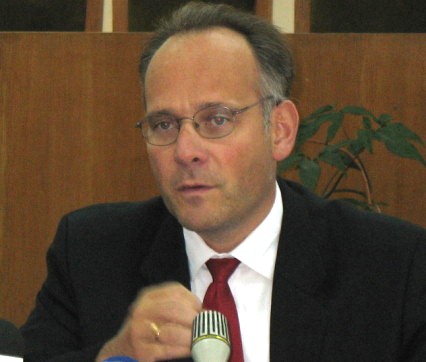The main concern of the International Monetary Fund in Moldova is, once
again, inflation. IMF Resident Representative Johan Mathisen told a news
conference Friday that after a positive trend registered at the
beginning of the year, the inflation has increased substantially over
the last couple of months. In his words, a strong push is needed to
lower inflation down to a single-digit level, as agreed with IMF and in
line with the neighbour countries.

“It is clear that Moldova will not be regarded as a safe destination for
investment until macroeconomic stability is firmly established”, the IMF
official said.
Johan Mathisen announced that an IMF staff visit is scheduled for
September 20. The main discussions of the mission with the Government
are expected to focus on the Budget Law draft for 2008, as well as on
actions that can be taken to offset the impact of recent food price
increases, which will obviously trigger another price hikes.
According to the IMF official, fiscal performance appeared to have
been better and economic growth stronger than expected, especially in
the first quarter. “Of course we are yet to assess the full impact of
this year’s drought”, Mathisen said.
Johan Mathisen didn’t exclude the fact that, if IFM finds it
suitable, it will review the indicators for this year, as it was in 2006
when Moldova was affected by the Russian embargo on Moldova wines.
Moldova’s performances under the three-year agreement with IMF are
formally assessed twice a year. The next assessment mission is scheduled
for late November. The IMF mission will assess, among others, the
competitiveness of Moldovan products in external markets, in view of the
recent appreciation of the national currency.
The Executive Board of the International Monetary Fund resumed
disbursements to Moldova in early May 2006, after more than a 3-year
long break. On 15 December 2006 IMF’s Executive Board approved an
increase in the size of the loan to about USD 167 mln.
IMF urges Moldova’s Government to avoid controlling bread prices
Chisinau (IPN) The International Monetary Fund (IMF) urges the
Government to try to find more efficient means to mitigate the impact of
potential bread price hikes on the poor segment of the society than the
practice of controlling bread prices, IMF Resident Representative
Mathisen told a news conference Friday.
While IMF understands the intention behind the proposal to control
bread prices, because the increase in food prices has a substantial
impact on the poor, in economic terms, administering prices, such as on
bread, is very inefficient. The consequences in many other countries
have been that instead of targeting the groups that actually need the
assistance, the measure targets everybody. In addition, the companies
whose production was subject to price control have been totally
decapitalised, the IMF official explained.
Also Friday, Prime Minister Vasile Tarlev stated at the meeting of
the Commission for Emergencies that the Government will obse rve the
compliance of bakeries with the laws concerning prices on the so-called
‘social bread’. He stated that there are no reasons for increases in
bread prices, not until January at least. According to the prime
minister, most of the bakeries have stockpiled the necessary supply of
products so as not to raise bread prices. |